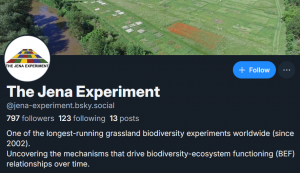New publication from Isbell et al. in Front Ecol Environ: Expert perspectives on global biodiversity loss and its drivers and impacts on people
Despite substantial progress in understanding global biodiversity loss, major taxonomic and geographic knowledge gaps remain. Decision makers often rely on expert judgement to fill knowledge gaps, but are rarely able to engage with sufficiently large and diverse groups of specialists. To improve understanding of the perspectives of thousands of biodiversity experts worldwide, we conducted a survey and asked experts to focus on the taxa and freshwater, terrestrial, or marine ecosystem with which they are most familiar. We found several points of overwhelming consensus (for instance, multiple drivers of biodiversity loss interact synergistically) and important demographic and geographic differences in specialists’ perspectives and estimates. Experts from groups that are underrepresented in biodiversity science, including women and those from the Global South, recommended different priorities for conservation solutions, with less emphasis on acquiring new protected areas, and provided higher estimates of biodiversity loss and its impacts. This may in part be because they disproportionately study the most highly threatened taxa and habitats.

Expert estimates of (a) global biodiversity loss and (b, c) its impacts. (a) Medians of estimates and upper and lower bounds for past biodiversity loss (white circles, lines) and future biodiversity loss by 2100 if current trends continue (rightward gray arrows) or if conservation efforts are increased (leftward gray arrows). Where available, IUCN estimates are shown (red lines). (b) Expert estimates (black) as well as lower (blue) and upper (red) bounds for impacts of three levels of biodiversity loss (jittered on the x-axis). (c) Combining estimates of past biodiversity loss (a) and its impacts (b, linearly interpolated) shows the estimated impacts of past biodiversity loss. Sample sizes show the number of responses, which do not always sum to the total because respondents were not required to answer all questions.
Reference:
Isbell, F., Balvanera, P., Mori, A.S. et al. Expert perspectives on global biodiversity loss and its drivers and impacts on people (2022). Front Ecol Environ, 1-10. https://doi.org/10.1002/fee.2536



